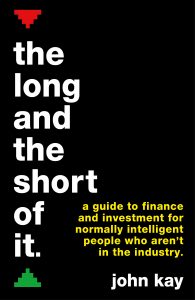A new and completely revised edition of The Long and the Short of It – finance and investment for normally intelligent people who are not in the industry will be published in early December by Profile Books. Readers of the first edition – written as the global financial crisis was unfolding in 2008 and published in early 2009 – will know that there have been many changes to the investment scene since then. Interest rates have fallen to historically unprecedented levels, taxation of savings income has effectively been abolished for people with modest portfolios, and events have required a rethinking of the meaning of risk for the long-term investor. And there is the rise of ‘fintech’, with the suggestion that technology can take the place of traditional intermediaries. Pre-order facilities are available on my website. You can also read the foreword here.
If you can’t wait till November, a few remaining copies of the first edition are available at the bargain price of £5. And if you are not familiar with the original book, here as taster are the opening paragraphs.
P.S. The first edition was aimed firmly at a UK audience. But there will be global and US editions of the new version for those for whom a 401(K) is more relevant, or as irrelevant, as an ISA or SIPP. Watch here for news.
Can you be your own investment manager?
Many people think that successful investment is about hot tips. If someone rings you with a hot tip, ask yourself ‘Why is he calling me?’ and put down the phone. If you act on a hot tip from a friend, you may lose a friend and some money. If you act on a hot tip from a stranger, you will just lose some money.
Books tell you how to become rich from stocks. Software programs and training courses claim to help you trade successfully. The authors assert that, with their assistance, you can make a comfortable living playing the market. Before you succumb, ask the following question: If I had a system that held the secret of lazy riches, would I publicise it in a book from which I will earn – at most – a few thousand pounds? Writing a book is hard work, believe me.
You might already have asked a similar question: Why would anyone who could write a book like this one choose to do so? I am one of a minority, perhaps eccentric, who find the study of financial markets intellectually engaging. And I enjoy writing, and hope that you enjoy reading this book as much as I have enjoyed writing it.
My target reader wants to make good returns on investments without worry. He or she probably thinks that managing money is a chore, and that people obsessed by the stock market are sad. My target reader’s financial objective is to have enough financial security not to have to worry about money. My target reader would be happy to go on holiday, even for months, and not look at his or her portfolio. My target reader is willing to take risks, but only with small amounts.
My target reader is a retail investor. There are regulatory provisions that distinguish high net worth investors, sophisticated investors, professional investors. My target reader may also be some or all of these things. By retail investors I simply mean someone who is investing his or her own money. The purpose of this book is to help such a reader become an intelligent investor who can be his or her own investment manager. If you are hesitant about taking on that responsibility, you should, by the end of this book, be able to ask penetrating questions of anyone who offers you financial advice. This book is not for people who want to become professional traders, but for those who want to sleep securely, knowing that their portfolio is in the most trustworthy of hands – their own.











